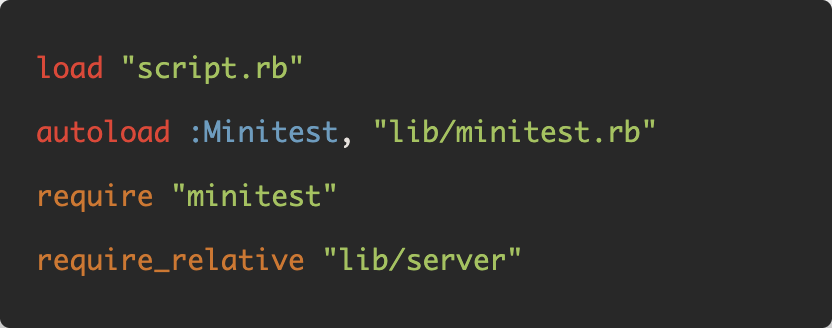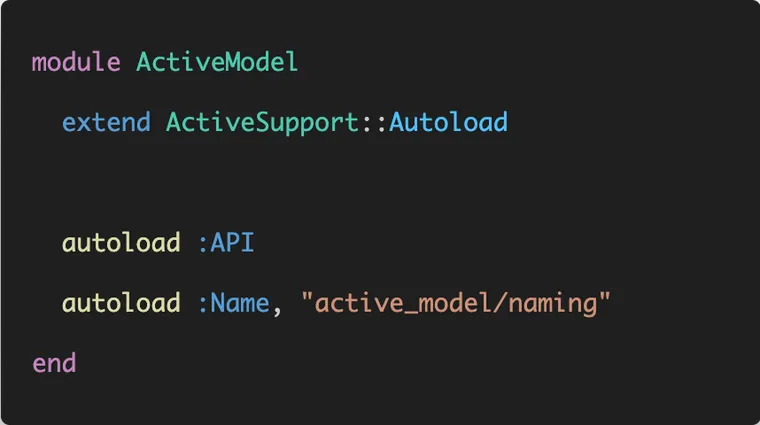Typically, you use require to load libraries and modules your Ruby code needs.
require 'net/http'The Ruby interpreter loads the required code as soon as it comes across the require method.
However, often you may not want to load all the dependencies as soon as possible. If they take a long time to load, it can slow down your application initialization process. This is really important during local development and also when running tests. You want to load, run, and test the app as quickly as possible, without loading any code that you won't use.
In these cases, to speed up the initialization process, Ruby provides the autoload method that lazily loads the specified modules. In addition, Rails overrides and abundantly uses this method to set up various sub-frameworks like ActiveModel and ActiveStorage, etc.
The first time I came across autoloading, I was pretty baffled, as I hadn't seen something like that in C# and JavaScript. After a little bit of digging, it turned out to be a simple and pretty useful concept.
So, what does the autoload method do, and how does it work?
Let's try to understand Ruby's version first.
Autoloading in Ruby
The autoload method takes two arguments: Module Name (can be either a string or a symbol) and filename (string). It registers the filename to be loaded the first time that module is accessed.
autoload :Payment, '/lib/modules/payment.rb'What it means is that Rails won't load the payment.rb script until you actually need it. It will only load it when you first use the Payment module in your codebase.
Using autoload allows you to speed up the initialization of your library by lazily loading the modules that your code depends on. It won't load the library or framework code you don't need.
Autoloading in Rails
Ruby on Rails provides its own autoload method via its Active Support framework. It allows you to load modules based on Rails naming conventions, by automatically guessing the filename based on the module name.
module ActiveModel
extend ActiveSupport::Autoload
# autoload this module from the
# active_model/secure_password.rb file
autoload :SecurePassword
endIn this example, Rails will look for the SecurePassword module in the active_model/secure_password.rb file.
Here's the simplified implementation of this method in Rails.
def autoload(const_name, path)
unless path
full = [name, const_name.to_s].compact.join("::")
path = Inflector.underscore(full)
end
super const_name, path
endIf the path is not provided, Rails guesses the path by joining the constant name with the current module name and generating its underscored and lowercase form. Finally, it calls Ruby's autoload method by calling super and passes the module name and the generated path.
For example, consider the following code:
module ActiveModel
extend ActiveSupport::Autoload
autoload :API
autoload :Name, "active_model/naming"
endThe first time you use the API module, Rails will load it from active_model/api.rb file. In contrast, when you need the Name class, it will be loaded from the active_model/naming.rb file.
Autoloading Multiple Modules From the Same Directory
If multiple modules live under a common folder structure, you can also use the autoload_under helper.
module ActionController
extend ActiveSupport::Autoload
autoload :API
autoload :Base
autoload_under "metal" do
autoload :Cookies
audoload :Flash
end
endThe Cookies and Flash modules will be loaded from action_controller/metal/{cookies/flash}.rb files.
Autoloading Multiple Modules in the Same File
If a single file contains multiple modules that you want to autoload, use the autoload_at helper. For example, the action_view/buffers.rb file contains two modules: OutputBuffer and StreamingBuffer. To autoload them both, Rails uses the following code:
module ActionView
extend ActiveSupport::Autoload
autoload_at "action_view/buffers" do
autoload :OutputBuffer
autoload :StreamingBuffer
end
endEager Load Modules As Necessary
Finally, you can also define a set of modules that need to be eager loaded using the eager_autoload method.
class Cipher
extend ActiveSupport::Autoload
eager_autoload do
autoload :Aes256Gcm
end
endThen you can eager load the Aes256Gcm module by calling the eager_load! method (notice the ! bang)
Cipher.eager_load!The original implementation of the eager_load! method looped through the modules marked to be eager loaded and simply required them as follows:
def eager_load!
@_autoloads.each_value { |file| require file }
endHowever, in the latest version of Rails, it's using the const_get method to load the constants, see this PR for more details.
Anyway, that's all for now. If you're curious to learn the difference between load, autoload, require, and require_relative methods, check out this article:

I hope you liked this article and you learned something new.
As always, if you have any questions or feedback, didn't understand something, or found a mistake, please leave a comment below or send me an email. I look forward to hearing from you.
If you'd like to receive future articles directly in your email, please subscribe to my blog. If you're already a subscriber, thank you.


